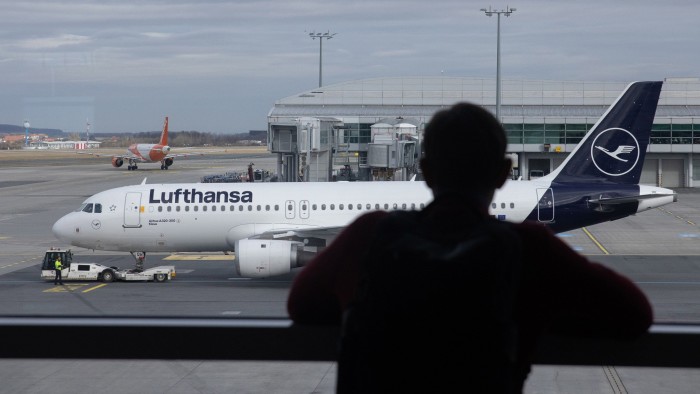Stay informed with free updates
Simply sign up to the Airlines myFT Digest — delivered directly to your inbox.
Europe’s airlines have called on the EU to pull back on its environmental rules, in a significant shift in tone for an industry which is struggling to decarbonise.
Speaking on behalf of 17 airlines, the bosses Ryanair, British Airways owner International Airlines Group, Lufthansa and Air France-KLM said the bloc should review a rule that mandates fuel suppliers at airports to supply a portion of sustainable aviation fuel (SAF) for departing flights.
The chief executives of the leading groups also said the EU carbon pricing rules for aviation, which forces industries to buy enough allowances to cover their pollution, should be eased and brought in line with a cheaper, global standard.
“We need to cut and revise EU regulations quickly,” said Carsten Spohr, chief executive of German airline group Lufthansa.
Brussels has come under pressure from business groups to cut back its sustainability agenda to help European companies become more competitive, particularly as President Donald Trump launches a deregulation drive in the US.
The bloc’s economic competitiveness tsar last month suggested the EU was prepared to water down some of its green policies to placate the bloc’s industry.
Speaking at a meeting of trade body Airlines for Europe (A4E) in Brussels, the chief executives said the EU should delay rules that require fuel companies to provide airlines with an increasing amount of “sustainable aviation fuel” each year. The requirement is for airlines to use 2 per cent this year, and rises to 6 per cent by 2030.
These fuels — which are typically made from organic material such as used cooking oil or crops — can reduce the net carbon emissions from flying by about 70 per cent. But they are far more expensive than fossil fuels and in short supply.
“Unless action is taken now the only realistic solution is to move the 2030 SAF mandate date to the right,” said Luis Gallego, chief executive of IAG.
Airlines blamed oil majors for cutting back on the supply of renewable fuels.
“If the supply is not there, you can’t buy it, that’s simple economics 101,” said Ryanair boss Michael O’Leary.
The UK has a mandate that will require 10 per cent of fuels to be SAF by 2030. O’Leary said the UK government “won’t have any choice” but to water this down.
He added that bringing the EU Emissions Trading Scheme into line with the global aviation industry’s Corsia system, which charges a far lower price to pollute than the EU system, would “create a level playing field for consumers here in Europe”.
However, a 2021 unpublished EU report, seen by the Financial Times, found that Corsia risked being ineffective, poorly enforced and “undermining” the EU’s climate policies.
Diane Vitry, aviation director of Transport and Environment, an environmental NGO, said airlines were “jumping on an anti -green trend which will disappoint customers who are trying more and more to fly green”.
She added that Corsia was “such a weak system that effectively provides cheap offsets which does not put an adequate price on CO₂”.
But Spohr said EU consumers deserved a more “honest” debate about decarbonisation, particularly as fuel companies have cut back on the production of some renewable fuels and Airbus has delayed its ambitions for the introduction of a hydrogen-powered aircraft.
“Things are changing in the debate and in terms of engineering decisions . . . engineers are stopping work on hydrogen and have moved from SAF production to fossil fuel production that will have an impact on reaching net zero. We owe them a more honest debate on this,” he said.
Read the full article here




